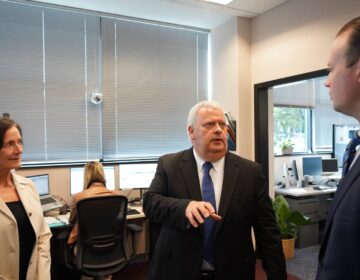Patrick Kennedy reflects on new book, advocacy for better mental health care
Former congressman Patrick Kennedy and journalist Stephen Fried have teamed up to write a new book together, Profiles in Mental Health Courage.
Listen 11:42
This June 3, 2013 file photo shows former Rhode Island Rep. Patrick Kennedy at the National Conference on Mental Health, in Washington. (AP Photo/Susan Walsh, File)
This story is from The Pulse, a weekly health and science podcast.
Find it on Apple Podcasts, Spotify, or wherever you get your podcasts.
In 1991, Patrick Kennedy, the youngest son of then U.S. Senator Ted Kennedy, was serving in the Rhode Island state legislature when a bombshell article came out in the National Enquirer. Kennedy’s former roommate from an addiction treatment facility had sold his story to the tabloid.
The salacious article claimed that Kennedy had a raging cocaine habit when he was attending an exclusive prep school which is why he had to go to rehab. In a letter to voters, Kennedy admitted that he had gotten treatment as a teenager, but declared that “problems of my adolescence have no bearing on my public service.” He was re-elected, and in 1995, he went on to serve in Congress, where he supported the Mental Health Parity Act even though stigma around mental illness and addiction was much greater back then. Putting your name on mental health legislation could raise eyebrows — but Kennedy felt that his personal connection to these issues was already known.
“I didn’t have to worry as much about being found out, because all of that was already public,” he said.
But “all of that” was not public. There was so much more that the public didn’t know yet. Kennedy was still struggling with addiction issues, and had been in treatment for depression since he was a teenager. He crashed his car into a barricade on Capitol Hill while driving intoxicated in 2006. In 2009, he went into rehab again, and decided not to run for re-election in 2010.
From there he devoted his life to mental health advocacy which has also meant being radically honest about his own struggles. He says it’s something he learned to do in phases, little by little.
“I just focus on my recovery and part of my focus on recovery is acceptance, acceptance that I need help, acceptance that I have to change everything, acceptance that I have to do things that are not comfortable for me to do because frankly, part of treatment is doing the uncomfortable things,” Kennedy said.
In 2012, author and journalist Stephen Fried first wrote an in-depth profile about Kennedy for Philadelphia Magazine and then a few years later they wrote a book together called “A Common Struggle.”
“Patrick talked a lot about his late father, about his mother’s struggle with alcoholism and her family in a way that it’s not like it was a big secret, but I think that Patrick talked about it in a much more open and human way,” said Fried.
Subscribe to The Pulse
In one conversation with Fried, Kennedy spoke candidly about the silence that hung over his family growing up. “
I never thought about it as mental health issues, everything in my household was in the context of alcoholism,” Kennedy said in a recorded Zoom meeting, after Fried asked him how issues of mental illness or addiction were discussed in his family.
“I didn’t know anything about trauma and the fact that my uncles were murdered. It wasn’t like, ‘Oh, and that might be part of a discussion about what my dad’s going through, what my mom’s going through. I didn’t ever get the sense that it was even self-medicating.”
Now, Kennedy and Fried have written another book together, Profiles in Mental Health Courage, which features 12 stories of people living with mental illness.
“I have never met people who didn’t want to be better understood. I just find that they generally think that they won’t be,” said Fried. “The question is: How do you get people to really understand what it’s like to have these illnesses, their recurrence, the challenges in the family?”
Fried says the goal for the book from the start was to get people to empathize with other people’s struggles. “What if we could find people that nobody knew but who had amazing stories and who weren’t gonna tell them in an advocacy way? They were just gonna tell them as a story. The way you wished you could tell your family members they would understand. The way you wished you could tell your boss so they would understand.”
Each chapter in the book features a different person’s story, told in a way that is personal, painful and raw. The stories speak of couples and families trying to cling together as issues like PTSD, addiction, or depression threaten to tear them apart. Moments of despair give way to moments of hope, and the possibility of recovery. Fried says each story is based on multiple, in-depth interviews.
“It’s really a process,” explained Fried. “It’s the amount of time that we keep coming back to things to see if there’s more truth to be had or more process to be had. We worked with people’s medical records.” He says the story telling in the book goes beyond lived experience. “Lived experience is an incredible thing, but lived experience is only what you remember. And people’s memories aren’t always perfect.” He says the goal is to make the stories as accurate as possible. “How do we talk to somebody else who will give us a piece of information and then come back to the person and say, ‘well, this person told us this. Can you talk about that?’”
He says the process was involved and often emotionally intense for participants, some of whom were interviewed more than 20 times. But participants had control over the process at all times. They could ask for sections to be removed, and they could drop out.
“And that happened. We had one chapter that was completely done, ready to go,” said Fried. “And the couple that were involved took their opportunity and said: ‘We don’t feel comfortable doing this.’ I remember the one member of the couple was telling us on Zoom crying because they’d been through a lot to do this chapter, but they also felt they weren’t ready to do it. And we were okay.”
Kennedy says a lot of the people in the book were motivated by a desire to help.
“Our own recovery depends on us helping others. That’s our primary purpose. And that’s a spiritual element. And I think that helps people overcome a lot of the challenges in telling their story, because they’re doing it to help someone else.”
One of chapters in the book features Kennedy’s cousin Mark McMurrey, his son Harry died by suicide in 2017.
“I didn’t expect Mark to really want to do this,” said Kennedy, “because like most families that have these illnesses well entrenched in their family, there is even more need to kind of keep the codes of secrecy alive and well and unbreakable.” He says McMurrey opened up over time, and they also had long conversations with other people who knew Harry. Kennedy says overall, the process has been healing for his cousin.
“As a father of a suicide victim, there’s really so much of a self imprisonment, because there’s shame, there’s terrible trauma, and grief. But because he went through this whole process, it showed that there are ways for people to bring some closure in the story by talking to others that have experienced a piece of what they had gone through,” said Kennedy.
Fried said before the interviews for the book, McMurrey, his other son, Belton, and Harry’s friend had never talked together about Harry’s suicide. They dealt with their pain in individual ways, but they hadn’t really shared their perspectives. The process helped to connect some of the dots.
Kennedy says these conversations made it clear how much stigma and shame can get in the way of treatment.
“If all of them had talked to each other about each of their perspectives on what Harry was going through, there would have likely been a higher rate of alarm that would have gone off in all of their heads,” he said. “But no one talks amongst themselves because they worry, ‘Oh, that’s stepping on their personal boundaries’ or ‘that’s not my business,’” he added.
Kennedy says he and his cousin Mark McMurrey have grown much closer in the process of writing the chapter for the book.
“It makes me feel more connected with him and him to me in a way that families are supposed to be intimate. You’re supposed to have that transparency and connectedness. It’s often not the case when you have these illnesses kind of weighing over you.”
Kennedy and Fried hope the book will encourage people to talk about their struggles — to seek help when needed — and ultimately, that it will lead to policy changes around making mental health treatment as accessible as other health treatments.
WHYY is your source for fact-based, in-depth journalism and information. As a nonprofit organization, we rely on financial support from readers like you. Please give today.







